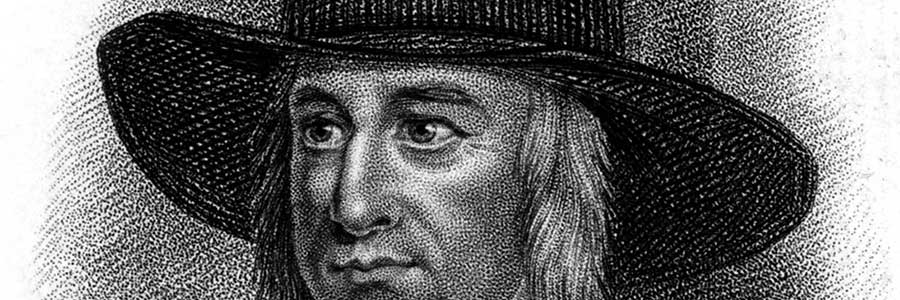The Quaker expression of this radical expression of Truth was first offered by George Fox in England in the 17th century. George Fox was born in Leicestershire in 1624, the son of a reasonably prosperous weaver and an intensely religious mother. A serious, introspective, physically powerful youth, he was early drawn to religious concerns and was genuinely shocked by the failure of the “professors”, that is, professing Christians, to live their beliefs.
At 19, he left home on a spiritual quest, during which he sought out and challenged the religious leaders everywhere to answer his questions. Nowhere did he find satisfaction, until in 1647, having “forsaken all the priests” and in despair, he heard a voice which said, “There is one, even Christ Jesus, that can speak to thy condition.” The direct experience changed his life, his religious conceptions, and his view of the human-Divine relationship. He devoted the rest of his life to sharing his new understandings.
He was imprisoned eight times. He suffered cruel beatings, great strain and deprivation. And he proved a true religious genius, an heroic and indomitable figure whose journal and other writings continue to be basic works of the Religious Society of Friends, whose founder he is generally conceded to be. He knew the Bible so well that about 75 percent of his writing is biblical allusion. He never intended to found a new sect. He believed his discovery was universal that he had rediscovered primitive Christianity, and its embrace went far beyond the institutional limits of the Christian Church, which in its 17th century condition he regarded as apostate.
In briefest summary, the principles at which he arrived included the following:
- That God is directly accessible to all persons without the need of an intermediary priest or ritual;
- That there is in all persons an in-dwelling Seed or Christ or Light (he used all these metaphors) which is of God and which, if they will but heed it, will guide them and shape their lives in accordance with the will of God;
- That true religion cannot be learned from books or set prayers, words, or rituals, which Fox called “empty forms,” but comes only from direct experiences of God, known through the Seed or Christ or Light within;
- That Scriptures can be understood only as one enters into the Spirit which gave them forth;
- That there is an ocean of darkness and death—of sin and misery—over the world but also an ocean of light and of love, which flows over the ocean of darkness, revealing the infinite love of God; and
- That the power and love of God are over all, erasing the artificial division between the secular and religious so that all of life, when lived in the Spirit, becomes sacramental. The traditional outward sacraments, again characterized as empty forms, are to be discarded in favor of the spiritual reality they symbolize.
—Gordon Brown, “Introducing Quakers”

